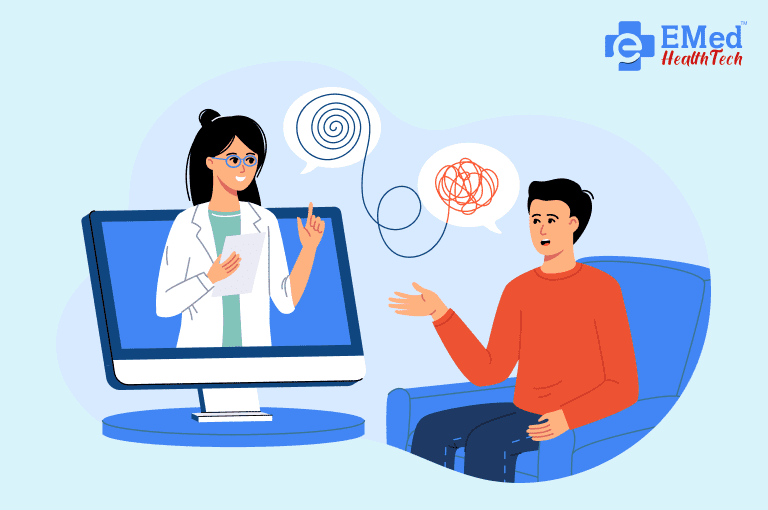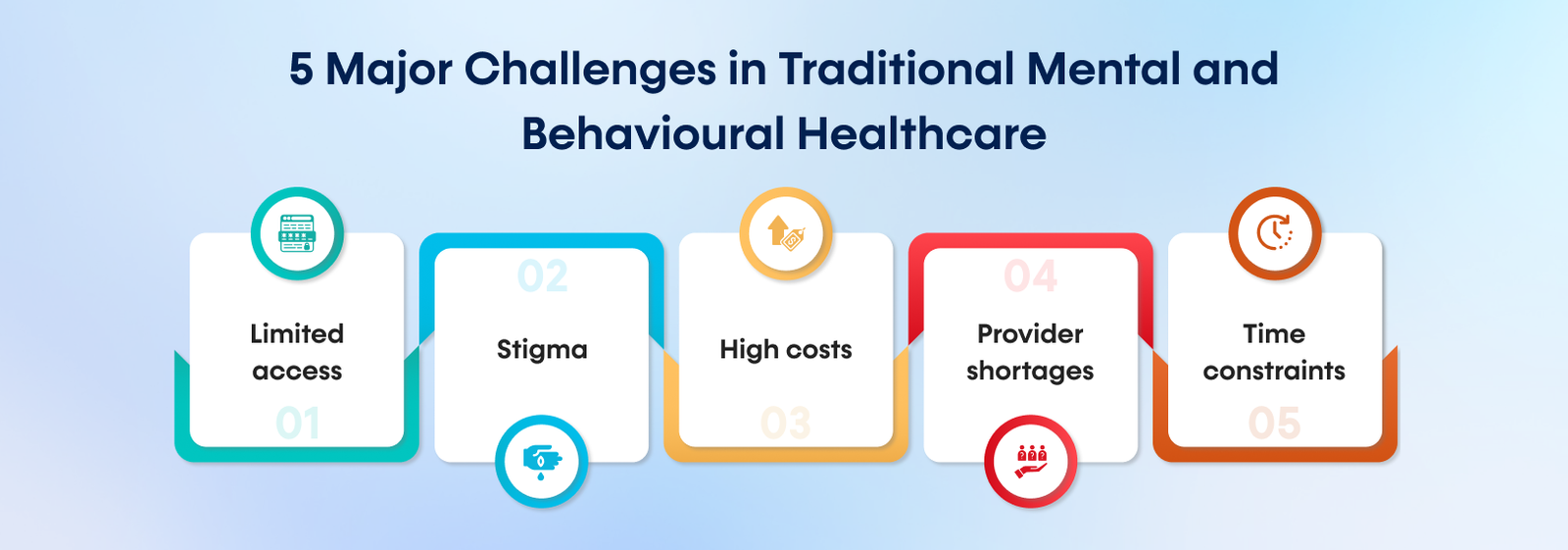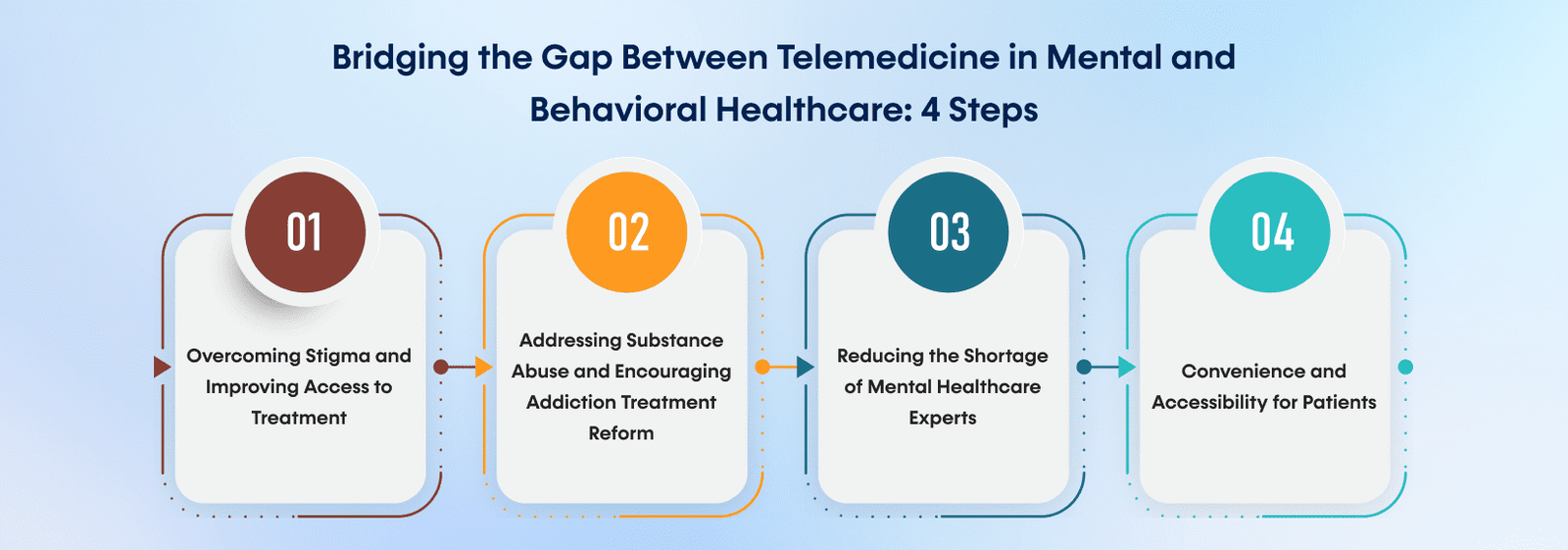Mental health has been a central topic of discussion in healthcare globally, and for good reason. Stress, anxiety, depression, and other types of mental illness are increasing. People want new ways to develop mental wellbeing and take care of their mental health without stigma, and without adding to their frustration. Mental health app development is a way to do this.
With the growing awareness of mental health needs, the demand for digital mental health opportunities continues to rise. From meditation and mindfulness apps to online therapy sessions, the future of mental health care is being shaped by technology. Building a solid, secure, and user-friendly mental health app development is not something you want to do on your own, and that’s exactly when the development team you partner with comes in.
Let us break down how mental health technology is evolving and why working with experienced developers to help create mental health apps will be critical to your success.
Rise of Mental Health Apps: Meeting a Global Need
The digital age has transformed the way people access mental health support, and technology has unlocked doors to services that didn’t exist before. Whether a guided meditation from a smartphone before going to sleep, or conducting a face-to-face therapy session via video-call, or providing journaling tools by which people can track their emotional states over time, mental health apps provide users with a safe and private place to explore, manage, and develop their emotions on their terms.
Recent reports indicate that the global mental health apps market is growing tremendously, with revenue expected to exceed $17 billion by 2030. The projections illustrate the growing trust that users are placing in digital solutions. Plus, the mental health app market is accelerating momentum, driven by a trifecta of mental health awareness, smartphone penetration, and the movement towards remote health solutions.
However, while the opportunities are boundless, there are a few obstacles to propelling an effective therapy app development project. Therapy app development requires a combination of specialised abilities, health compliance, and understanding of applied mental practices.
What Is Mental Health App Development?
Mental Health App Development is the design and development of portable or web-based applications that include any number of features, including:

- Self-assessment tools
- Mood and emotion tracking
- Therapy session booking
- AI-driven chatbots for support
- Real-time messaging and video calls
- Meditation and breathing exercises
- Personalised therapy plans
Mental health apps must ensure high execution, security, and believe, because clients give individual and confidential data.
Developing such applications requires collaborating with mental health specialists, UI/UX designers, and experienced mental health app developers, who understand the technical and ethical issues related to mental wellness.
Why You Need an App Development Company?
You may be saying, “I can hire a couple of freelancers or use an app builder.” At first, that appears to be cost-effective, but it regularly needs the scale, security, and compliance required for healthcare applications. Here’s why hiring a professional App Development Company makes a world of difference:

1. End-to-End Expertise
A dedicated team for your mental health app development will give a comprehensive approach to the project, guiding you from ideation to wire framing, to deployment, and continuing as support once the app is released. They know the big picture of the complete app lifecycle and will offer you strategic and vital insights to improve your app’s usefulness and client engagement.
2. Healthcare Compliance & Data Security
Mental health apps are subject to laws such as HIPAA, GDPR, and local data protection laws and policies. A dependable mental health app development company will ensure all data is stored and transmitted safely, ensuring client secrecy.
3. Custom Features Built for Engagement
Generic Solutions will not work in this field. Custom apps created by experts are built utilising advanced features such as machine learning algorithms, custom-built personalised therapy plans, and the ability to coordinate wearables. These features can improve engagement and results.
4. Scalability & Maintenance
As your client base increases, your app’s capabilities must grow as well. A reputable app development company will give a scalable design and longer-term upkeep of the app to ensure it works consistently as the number of requests increases.
5. User-Centric Design
Therapy is exceedingly individual. An empathic, intuitive design is key to building client belief. A proficient team will ensure that the client interface/user experience (UI/UX) is built for clients, regardless of age or condition.
Key Features to Include in a Mental Health App
Whether you’re building a therapy app or a holistic wellness app, here are the basic features that you’ll need to consider:

- User Profiles: Personalised logins with customizable dashboards.
- Mood Tracking: Daily tracking of mood and feelings acknowledgement.
- Live Chat/Video Therapy: Real-time interaction with licensed professionals.
- Push Notifications: Friendly nudges for mindfulness or therapy sessions.
- Resource Library: Videos, articles, and podcasts about mental wellness.
- AI Chatbots: For initial support, 24/7.
- Crisis Support Integration: Direct connections to emergency services or crisis hotlines.
An experienced mental health software team will assist you in prioritizing these features based on your audience and targets for the app.
Choosing the Right Mental Health App Developers
When considering a mental wellbeing app improvement company, inquire about the following questions.
 1. Proven Experience in Healthcare Apps
1. Proven Experience in Healthcare Apps
Do they have a history of successful development of a healthcare or therapy app? Ask for testimonials, case studies, and product demos.
2. Compliance-First Approach
Ensure they are properly aware of privacy and regulatory compliance. Inquire about data governance, encryption protocols, and information handling.
3. Collaborative Communication
Find a vendor who has open communication, regular updates on progress, development cycles, and other Agile practices.
4. Post-Launch Support
Discover if they will keep you within the loop after launch for bug fixes, updates, scaling, etc. Ongoing support is a huge portion of digital health.
5. Integration Capabilities
Does the team have the capacity to integrate your app with wearables, third-party APIs, or telehealth platforms? Interoperability with other stages is a major differentiator in an app’s long-term value.
Do you know more? Mental Health Software Development: A Complete Guide
The Future of Mental Health Technology
As AI, big data analysis, and wearables, mental health apps will become radically more proactive. With augmented predictive archiving analytics, apps might soon help users identify patterns of burnout before they reach critical levels. We may also soon see the introduction of virtual reality therapy and gamified CBT (Cognitive Behavioral Therapy).
In this fast-moving space, you’ll want to invest in the best mental health app developers now, so they can help make your app what the future will need.
Conclusion
The future of mental health is digitization, and mental health app development is in the driver’s seat. People want private, accessible, and flexible ways to manage their emotional and psychological well-being. Reflecting on that, demand for engaging, secure, and AI-enabled smart apps will continue to grow.
Be that as it may, victory in this space requires more than a concept. It requires a correct app development company that has the capability, healthcare experience, and kindness required to supply genuine esteem to the client.
By working with a group of experienced mental health app developers, you’re lowering improvement risks and building an app that can genuinely change lives.
Ready to Build the Future of Mental Wellness?
Work with EMed Health Tech— a mental health app development company with the experience to build secure, scalable, and user-focused healthcare apps. Whether you are a startup or an established mental health service provider, we have the talent that can help you bring your vision to life.
Connect with EMed Health Tech and build a therapy app to make a difference.













